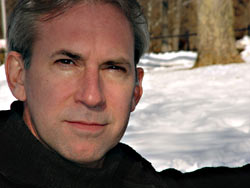David Esbjornson, artistic director of the Seattle Repertory Theatre, is my candidate for the most low-key theatrical personality in Seattle. Scandinavian and scholarly, unerringly polite (at a recent opening night, he stood holding the theater door for nearly a minute while several patrons filed out past him), he’s disarmingly casual in private. During our interview, he sprawls over his chair instead of sitting in it, like he’s in a late-night bull session at the dorm.
His voice often dips and rarely rises, leading to problems later when I’m hunched over my tape recorder, trying to extract his thoughtful but lengthy answers to my questions. He seems incapable of a sound bite. And when he’s talking about the Rep’s upcoming season, his focus is almost always on the other artists involved instead of himself.
This is surprising from a director who has worked on world premieres of plays by Arthur Miller, Edward Albee, and Suzan-Lori Parks, not to mention directing the first production of Angels in America: Millennium Approaches, the seminal play of the 1990s. (Talk about speaking softly and carrying a big stick!) But an even bigger surprise is that this subdued, gray-haired Minnesotan, for all his politeness, has a passion for experimental work, and is quietly introducing some of the most radical and challenging pieces that the Rep has seen in more than a decade—from last season’s My Name Is Rachel Corrie to the upcoming world premiere of The Breach, a tri-authored piece about Hurricane Katrina and its aftermath.
Or not “experimental,” exactly. “I shouldn’t use that word,” he admits. “It’s nonlinear narrative, and new voices that are approaching material in a slightly off way. Thom Paine [last season’s solo show, with a protagonist who ignored, offended, and fell half-asleep on his audience] borrowed from Beckett, borrowed from Albee. There are structures, there are characters in these plays—it’s not as dark or as out there as [Austrian avant-garde writer Peter] Handke.” Local audiences and critics haven’t always responded well to his choices, but Corrie‘s audiences and Thom Paine‘s notoriety were both highlights of last season.
Changing anything at an institution as large and established as the Rep is like setting a new course for an oil tanker, particularly if you’re a director who’s spent most of his career as a freelancer. “As an individual artist, you work someplace, and then move on. When you’re running a place like this, you stay, and artists come to you. You’re the guy, the suit.” But he’s found pleasure in matching other artists up with promising projects, as he’s done for this upcoming season with acclaimed director Tina Landau, known for her work on the anarchic Greek adaptations of Charles Mee. “Tina came to me with several projects, but knowing her sensibility, I asked her if she’d ever read Seamus Heaney’s translation of [Sophocles’] Philoctetes, The Cure at Troy. She hadn’t, but once she did, I could tell that she was excited by not only its source but its formality.”
Considering how much work is available for this director in New York and elsewhere, it’s heartening to hear him say that working with Seattle actors can be the most exciting thing about a project, as on his upcoming production of Twelfth Night. “I think it’s a brilliant play and want to do well by it, but what I get to do is watch Charles Leggett as Sir Toby and David Pichette as Feste—that’s the excitement. Casting a Broadway show is mostly about putting together a package.” His own approach to Twelfth Night will explore the play’s darker elements. “In most performances I’ve seen, the entire subplot involving Malvolio, which is remarkably cruel and dark, seems like it’s completely separate from this light comedy about love. But it’s not. There’s a very dark undertone throughout. Everyone thinks they know what they want, but no one ends up getting it.”
Shakespeare and other classics are generally seen as a way of satisfying a theater’s older audiences, but Esbjornson has a very different reason for doing these plays: to inspire and attract the young. “They’ve never seen these works. I want to do Shakespeare in a way that inspires them like I was inspired when I was young, and the best way to do that is treat the plays like they’re new to us as well. If you manage that, you can end up with something really interesting.”








